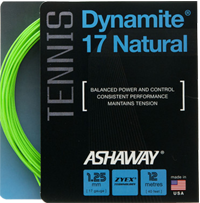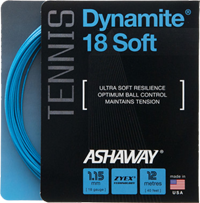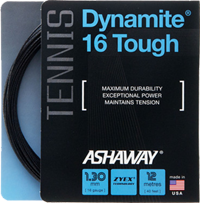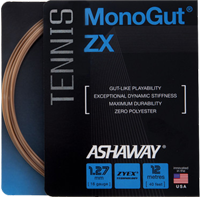|
|

Why Zyex® Now: An Interview with Steve Crandall
By Steve Crandall
Vice President, Sales & Marketing
Ashaway Racket Strings
Our Zyex®-based MonoGut® ZX tennis strings have gotten a lot of attention lately, and it seems that wherever I go, people ask me about them. This is not a bad thing, of course, but I thought it might be a good idea to answer some of the most commonly asked questions here in this column format. This will help me: A) put the material together in a way that makes the most sense; and B) not forget important stuff, which I always seem to do when talking off the cuff. You may think of this as an FAQ: I think of it as an interview with myself.
What was the idea behind making a Zyex-based monofilament tennis string?
SC: The idea behind Ashaway's MonoGut ZX was to bring a monofilament string to the tennis market that would have the power and comfort of natural gut at less than 1/3 the price. We have been working with Zyex in multifilament forms using nylon jackets for more than 20 years now and have had tremendous success in many racquet string areas. But we felt it was time to bring Zyex out in its 100% pure monofilament form, especially considering the prevalence of today's very stiff, heavy-hitting polyesters.
What's wrong with today's Polyesters?
SC: The pro tour has opened its arms to polyester because of its ability to generate spin at very high swing speeds. However, I do not think it's a good idea for club-level players to mimic the pros with these strings. It's like trying to drive a Formula One racer on the street. Polyester can work well for advanced amateurs or club players who have the high swing speeds and good hand eye coordination needed to reap its benefits, but it is counterproductive for most other players. Polyesters are especially bad for junior players because of the dangers to their arms and shoulders from impact shock. Even the pros complain of this.
What does Zyex bring to string that other materials do not?
SC: Several things, in addition to price. First, Zyex is a soft, arm-friendly string material. Second, it has excellent dynamic stiffness, which, in addition to softness, generates tremendous power. We call it "Soft Power." Third, Zyex in monofilament form, like our MonoGut ZX, offers spin potential which is right up there with polyesters. And finally, Zyex-based strings have natural tension holding characteristics that keep them fresh in your racquet far longer than other materials.
Without getting too technical, can you explain why Zyex performs so well?
SC: The easiest way is to refer folks to the experts at Tennis Warehouse University where they have a very interesting String Finder Chart that includes a ton of performance data which can be sorted by various categories, including arm-friendliness, spin potential, power, and control. They also explain what they mean by these terms and how they have derived the various performance numbers. For example, under "Softness," (measured in lbs./in.) they explain that, "lower stiffness results in less shock. Lower stiffness will result in more string deflection, longer dwell time, smaller increase in tension, and smaller peak impact force."
When you sort for "Power," you get the same data set as softness, because as they explain, "String stiffness is the key to power, control and feel. A soft string cushions the ball, and stores and returns impact energy; a stiff string uses energy to deform the ball, which loses rather than returns most of that energy."
"Spin Potential," they say, "is the ratio of the string-to-ball friction divided by the string-to-string friction. Spin is best generated when the friction between ball and string is high and the friction between the main strings and cross strings is low. This allows maximum sideways main string movement and snapback to spin the ball."
How does Zyex compare with other string materials in these categories?
SC: The performance of different string materials varies widely, but in terms of very round ballpark numbers, gut has an average stiffness rating of 100 lbs./in., Nylon around 150 and polyester 200+. In terms of energy return, gut is typically over 95%, nylon around 90% and polyester 85%. For spin potential, we're looking at 2.0 - 2.5 for gut (again, there are exceptions), 3.5 - 4.0 for nylon, and 4.0 - 7.5 for polyester.
Ashaway's Zyex monofilament, MonoGut ZX, has a stiffness rating (that is, power, control and arm-friendliness) in the same range as gut at 106, energy return in the nylon range at 89, and spin potential in the polyester range at 4.4. That's a combination you can't get with any other string. And when you add the natural tension holding capabilities of Zyex, and the fact that it sells for about one-third the price of gut, we think strings like MonoGut ZX have a great future.
So, do you think MonoGut ZX will work well for players at all levels?
SC: Absolutely. I think it has the potential to add value for players at all levels. The first and foremost beneficiaries would be junior and senior players who don't hit so hard—really, any players who have medium to low swing speeds. This is because even at lower swing speeds, MonoGut ZX offers tremendous power and comfort. It's much more user friendly. At the club and even the pro level it translates into being able to play a more varied game. These players don't have to just play a base line, hard-hitting, topspin game. They can play more serve-and-volley because of the extremely crisp pace of the ball, and they can modify their swings, using a greater variety of strokes and angles. So it can add a lot of variety to their game. And, of course, it's easier on their arms as well. Polyester has been called natural gut on steroids. We think MonoGut ZX is like natural gut on sale.
 |
 |
 |
 |
| Unlike polyesters and co-polymers, which are primarily monofilament constructions, Zyex can be constructed as a multifilament (Ashaway Dynamite 17 Natural or Dynamite 18 Soft); as a multistranded monofilament (Ashaway Dynamite® 16 Tough); or, as a straight monofilament in our new MonoGut ZX and MonoGut ZX Red. This, along with a broader range of gauges than either polyesters or gut, allows players to more closely tailor their string choice to their style of play. |
|

